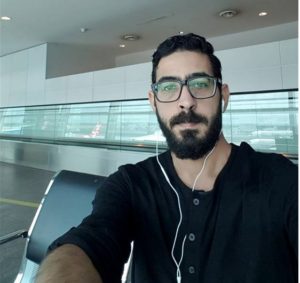Stranded Syrians
 Unable to return home, turned away at borders and denied visas, a group of refugees fleeing Syria’s war have found themselves stuck in limbo at locations across the globe.
Unable to return home, turned away at borders and denied visas, a group of refugees fleeing Syria’s war have found themselves stuck in limbo at locations across the globe.
Many of these are stuck at airports in transit across the world unable to find a country willing to accept them.
The whims of airport officials, combined with documentation problems and government policymaking on immigration, have helped contribute to an atmosphere where Syrians feel trapped, and forced to choose dangerous journeys on choppy waters that are often more expensive than travelling by air.
Hassan al-Kontar, a Syrian refugee, has been languishing at Kuala Lumpur Airport, in Malaysia, for months.
Mr al Kontar had been a successful professional working in the United Arab Emirates. But when the war broke out in 2011, the Syrian embassy refused to renew his passport and he was thrown into a detention centre.
Malaysia’s visa exemption for Syrian tourists offered him a temporary way out, but after three months, he had to move on because he could not get a longer visa and Malaysia does not accept refugees.
He had tried to get to Ecuador, a country he was familiar with because of South America’s long relationship with Arab migrants and, crucially, one which does not require a visa from Syrians.
The journey would have been the latest leg of a dangerous and difficult journey that began when the war broke out.
But months later, he is still there, living in Kuala Lumpur airport’s transit zone because his journey to Ecuador was stopped by an airline turning him away from his flight.
His back-up plan to go to Cambodia, also failed when he was deported. Then Malaysia refused to let him back in.
He is not the only one; since the war began, Syrians have spent weeks and months living in airports as far apart as Turkey, Russia and South Korea, stranded by visa policies and President Trump’s Muslim ban.
Mr al Kontar’s time at the airport has been challenging. He has access to two bathrooms and a waiting area in the transit section of the airport. AirAsia, the airline that took him back to Malaysia, provides him with three airline meals a day.
During the first few days at the airport, he slept on the chairs in the waiting area, but has now moved to sleep on the floor under a stairwell.
For weeks he has confronted basic logistical dilemmas such as where to take a shower, how to clean his clothes and where to dry them — documenting his daily life on twitter.
Nearly two months into his ordeal, his struggles continue. “The daily routine is the same, nothing has changed,” Mr al Kontar said.
He says he tries to stay positive, because “otherwise, it’s better to die”.
He says he can’t leave the airport because he was “blacklisted” for five years by Malaysian authorities for originally overstaying his visa. Returning to Syria is not an option either as he says he is liable to be arrested for evading military service.
After his tweets attracted the attention of international media, al Kontar says Malaysia gave him a temporary one-month pass into the country. It would allow him to leave the airport, but while he is thankful for it, al Kontar says it’s a temporary fix, with no long-term prospects.
“I am a highly-qualified professional — desperate for a place where I can be safe, legal, not looking over my shoulder or being on the run … a place where I can work and prove myself,” he said.
The United Nations Refugee Agency UNHCR said it has also been in touch with Mr al Kontar and continues to engage with the Malaysian authorities on his case, adding “reasonable assistance” has been offered for him to enter the country by the Malaysian government.
Much of the media coverage of his ordeal draws comparisons to the film “The Terminal,” in which Tom Hanks’s character is stuck at New York’s Kennedy Airport.
But mr al Kontar says that referring to a Hollywood movie, which may reflect the precariousness of his situation, takes away from his plight and the struggle of the Syrian people, who he says are “paying the price of the war they have nothing to do with.”
Laurie Nowell
AMES Australia Senior Journalist












